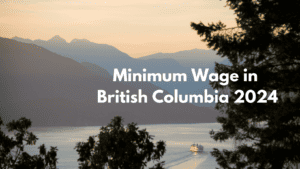
Hello, fellow Ontarians and curious minds! Today, we’re diving into a topic that touches the lives of many – the minimum wage increase in Ontario.
Whether you’re earning it, spending it, or just keen on economic trends, this change is something to keep an eye on. Let’s unpack what this means for everyone in our diverse and vibrant province.
Table of Contents
ToggleWhat Exactly is Minimum Wage?
Minimum wage is like the foundation of an employee’s earnings. It’s the lowest hourly rate that employers can legally pay their workers.
This isn’t just a number pulled out of thin air; it’s a carefully calculated figure meant to ensure that workers can afford a basic standard of living. In Ontario, we’ve seen this number evolve over the years, reflecting changes in our economy and cost of living.
The Current Minimum Wage in Ontario
As of October 1, 2023, the general minimum wage in Ontario saw a jump to $16.55 per hour.
This increase from the previous $15.50 is more than just a number change – it represents a significant shift in the earning potential for many workers across the province. From the bustling streets of Toronto to the serene landscapes of Muskoka, this change impacts a wide range of industries and individuals.
A Closer Look at Different Wage Categories
Ontario’s approach to minimum wage is not one-size-fits-all. There are specific rates for different groups of workers. For instance, students, who often juggle work and studies, have a minimum wage of $15.60 per hour.
Liquor servers, who traditionally rely on tips, now enjoy the same rate as general workers, ensuring a more stable income base. Understanding these variations is key to appreciating the diverse workforce that keeps Ontario thriving.
Special Rates for Unique Roles
Some jobs in Ontario come with their own set of rules, especially when it comes to minimum wage. Take wilderness guides, for example. Their pay structure is based on the length of their workday, acknowledging the unconventional nature of their work.
Homeworkers, who contribute to the economy from their homes, have a higher minimum wage of $18.20 per hour, recognizing the merging of their work and living spaces.
General Minimum Wage in Ontario 2024
- The current general minimum wage rates in Ontario apply to most workers.
- The current minimum wage rate for general workers is $16.55 per hour.
- This rate will be applicable from Oct 1, 2023, to Sep 30, 2024.
| Period | Minimum Wage Rate in Ontario |
|---|---|
| Oct 1, 2021 – Dec 31, 2021 | $14.35 per hour |
| Jan 1, 2022 – Sep 30, 2022 | $15.00 per hour |
| Oct 1, 2022 – Sep 30, 2023 | $15.50 per hour |
Minimum Wage for Students in Ontario - 2024
- The current student minimum wage in Ontario is $15.60 per hour.
- This rate applies to eligible student workers in Ontario.
- This minimum wage for students is valid until September 30, 2024
Let’s look at how the minimum wage for students has progressed over the years.
| Period | Student Minimum Wage Rate in Ontario |
|---|---|
| Oct 1, 2021 – Dec 31, 2021 | $13.50 per hour |
| Jan 1, 2022 – Sep 30, 2022 | $14.10 per hour |
| Oct 1, 2022 – Sep 30, 2023 | $14.60 per hour |
Peeking into 2024: What Might Change?
Looking forward, any potential changes to the minimum wage in 2024 will likely be announced by April 1, with implementation starting October 1.
This timeline gives businesses and workers alike time to prepare for the adjustment. It’s a period of anticipation and planning, as everyone speculates on how the changes might affect their lives and the broader economy.
Minimum Wage Increase - Effects
When the minimum wage goes up, it sends ripples across the economy. For workers, it’s often a cause for celebration, as it means more money in their pockets.
However, for business owners, especially small businesses, it can be a challenge. They need to balance higher wage expenses while maintaining their service quality and prices. This delicate balance is crucial for the health of Ontario’s economy.
Beyond the Hourly Rate
The story of minimum wage in Ontario isn’t just about the hourly rate. It encompasses a range of rules and considerations, like how commission-based earnings are treated, the value of room and board, and the three-hour rule.
These aspects ensure that workers are compensated fairly, not just for the hours they work, but also for the conditions under which they work.
Frequently Asked Questions about Minimum Wage in Ontario
Q1: Who is affected by the minimum wage increase in Ontario?
A: The minimum wage increase in Ontario affects a wide range of workers, including those in retail, hospitality, and other service industries. Specifically, it impacts general workers, students, liquor servers, and homeworkers, each with their own designated rates.
Q2: When did the new minimum wage rate take effect?
A: The new minimum wage rate of $16.55 per hour for general workers in Ontario took effect on October 1, 2023. This change marked a significant increase from the previous rate and applies until September 30, 2024.
Q3: How often does the minimum wage increase in Ontario?
A: Minimum wage increases in Ontario are not scheduled annually but are typically reviewed periodically. The government considers various economic factors, including the Consumer Price Index (CPI) and inflation rates, before deciding on an increase.
Q4: Are all workers in Ontario eligible for the minimum wage?
A: Most workers in Ontario are eligible for the minimum wage, but there are exceptions. For example, independent contractors and some professions have different wage agreements. It’s always best to check specific employment standards or consult a legal expert for individual cases.
Q5: How does the minimum wage increase impact small business owners?
A: Small business owners may face challenges with the minimum wage increase, as it can lead to higher payroll costs. However, it can also result in a more motivated workforce and reduced employee turnover. Business owners often need to adjust their budgeting and pricing strategies to accommodate these changes.
Q6: Will the minimum wage increase lead to higher prices for consumers?
A: There’s a possibility that some businesses might increase prices to offset the higher wage costs. However, this isn’t always the case, as market competition and other factors also play a role in pricing decisions.
Q7: What is the difference between the general minimum wage and the student minimum wage?
A: The general minimum wage applies to most workers, while the student minimum wage is for students under 18 who work 28 hours a week or less when school is in session, or during a school break or summer holidays. The student rate is slightly lower than the general rate.
Q8: Are tips included in the minimum wage calculation?
A: No, tips are not included in the minimum wage calculation in Ontario. Workers must receive the minimum wage as a base pay, and tips are considered additional income.
Q9: How can workers ensure they are being paid the correct minimum wage?
A: Workers should regularly check their pay stubs and be aware of the current minimum wage rates. If there are discrepancies, they should first address the issue with their employer or seek assistance from the Ministry of Labour.
Q10: Can employers pay less than the minimum wage if they provide room and board?
A: No, employers cannot pay less than the minimum wage even if they provide room and board. The cost of room and board can only be considered as part of the wage if it is mutually agreed upon in writing and adheres to the maximum allowable deductions set by the government.
Ontario Minimum Wage for 2024 - Conclusion
The minimum wage increase in Ontario is more than just a policy change; it’s a reflection of our evolving society and economy. Whether you’re directly affected by this change or simply interested in the economic health of our province, it’s a topic worth understanding and discussing.

